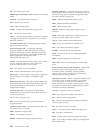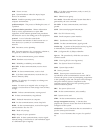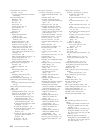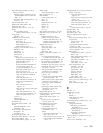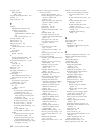DPR. In data communications, digit present.
DSC. In data communications, distant station
connected.
DRS. In data communications, data signal rate
selector.
DSA. (1) Direct select address. (2) Directory system
agent.
DSR. In data communications, data set ready.
DST. See dedicated service tools.
DTE. In data communications, data terminal
equipment.
DTR. In data communications, data terminal ready.
EBCDIC. See extended binary-coded decimal interchange
code.
EEPROM. Electrically erasable programmable read
only memory.
EPF. Enable panel (sub)function.
extended binary-coded decimal interchange code. A
coded character set of 256 eight-bit characters.
fault. An accidental condition that causes a functional
unit to fail to perform its required function.
fax. To transmit an image using a telephone system
and facsimile machines.
facsimile machine. A functional unit that converts
images to signals (from a telephone system) or that
converts received signals back to images.
fiber optics. The technology of guiding optical power
(light) through thin, transparent strands (fibers) that are
made of glass, fused silica, or plastic.
frame. A general term which refers to a rack or
expansion unit.
frame relay. A protocol for routing frames through the
communications network.
FSIOA. File server input/output adapter.
FRU. Field-replaceable unit.
GND. Ground (electrical).
guest partition. Select this option if the partition being
created will not have licensed internal code and
OS/400 installed, and instead is intended to use
another operating system such as Linux.
HDLC. High-level data link control.
HIPER. High impact or pervasive APAR
HRI. (1) Hardware resource information. (2) Human
readable interpretation.
ICT. I/O configuration table.
ID. Identification.
IDE. Interactive device exerciser.
IDLC. Integrated Services Digital Network Data Link
Control
IND, IND-A, IND-B. In data communications,
indicator (A and B refer to each individual signal of a
differential pair of signals).
initial program load (IPL). The process that loads the
system programs from the system auxiliary storage,
checks the system hardware, and prepares the system
for user operations.
input/output. Data provided to the computer or data
that results from computer processing.
input/output processor. One or more circuits that
process programmed instructions. It controls one or
more input and, or output device or adapters.
installation IPL. The process of loading code into
main storage and preparing for system operation from
an input/output hardware unit other than the system’s
primary load-source disk unit. This is also referred to
as a type D IPL or D-mode IPL.
installation device. A tape or optical device [CD-ROM
or a DVD] that is used on a type D IPL to load
Licensed Internal Code (LIC) segments into main
storage. The installation device must be on the same
input/output processor (IOP) as the load source. This
device can be used to load LIC code from the tape or
optical device onto the load source during restore or
installation operations.
intelligent printer data stream (IPDS). An
all-points-addressable data stream that allows users to
position text, images, and graphics at any defined point
on a printed page.
intermittent. Occurring or appearing in interrupted
sequence.
I/O. See input and, or output.
IOA. Input/output adapter.
IOBU. I/O bus unit.
IOP. See input/output processor.
IPDS. See all-points-addressable data stream.
IPI-3. The IBM implementation of the proposed
ANSI/X3T9.3 standard defining the electrical, data link
protocol, and functional interface.
Glossary of Terms and Abbreviations 327












